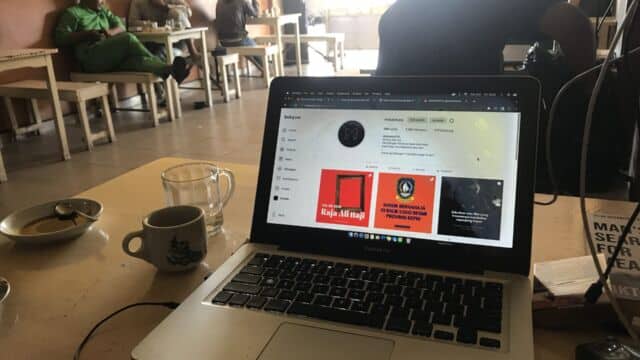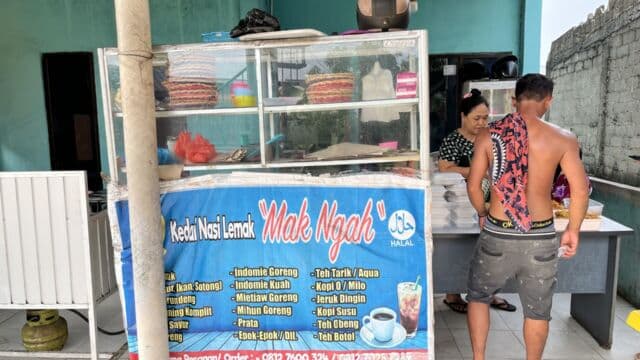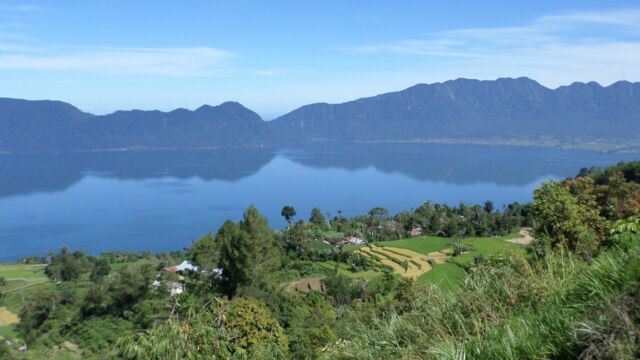How to Sell a Sack of Chillies in West Sumatra
Photo: Fatris MF
Padangluar Market | 2,500 words | Translated from Bahasa Indonesia by Sarah Leys
My fields are not especially large, but if they produce a decent crop, they can produce some decent returns for me. During the pandemic, I rarely went to campus. So I expanded the amount of land I was working and started spending more time out there. I’ve always sold my crop to the market by entrusting it to someone from my kampung who goes there regularly. Surely a hassle, I figured, to take it in myself. But recently, I decided to try to brave the market and sell my crops personally. ‘Try doing it yourself’, someone had said to me: ‘there’s real enjoyment to be had when you feel money placed in your hand for your own work in the fields, no matter how little’. So I set off for Padangluar Market.
The market is located about four kilometres from Bukittinggi and ten kilometres from where I live, so about twenty minutes by motorbike. For the selling of different types of vegetables, it’s the largest market in the Minangkabau highlands of West Sumatra. I’d already been there to shop for food or spices or to accompany my wife when she wanted to buy something, but never to actually sell.
For this trip I decided to ride a public village minibus, bringing with me my small sack full of chillies. When I got on, the minibus was still empty, and I was comfortable sitting on the long bench seats, even though the foam inside the cushions was leaking out and scattering here, there and everywhere. I opened the window as wide as possible to let the mountain air, cool and gentle, enter and pervade the bus. But after driving for not very long, the minibus filled with other passengers, almost all farmers wanting to sell their own goods at the same market. After more and more time, the minibus was more and more full, not just with people but with all their wares, as many as could possibly be fitted inside. I was pressed into a corner by everybody and their things. On the roof of the bus even more stuff had been piled, sacks and sacks of crops fastened with ropes, the knotted ends of which dangled down beside the open windows, occasionally slapping against my head.
The passengers, aside from me, were all women. It’s rare for men to ride a village minibus. If there are men, it’s those who are too old for motorbikes and have been banned by their children from driving, or those who for some reason don’t currently have access to a motorbike.
‘What are you bringing, Pak?’ asked a middle-aged woman immediately in front of me. Her body was on the large side. In her lap was a large red bag full of lettuce.
‘These chillies: just the one small sack’, I said.
She said, ‘How come you’re on the village minibus? Your scooter break down?’
What was I supposed to say. ‘I just wanted to try it’, I said finally, marshalling the best response I could think of. She smiled at me strangely.
The driver received a call. ‘That’s a long way. How much’ve you got?’ he said into the phone at his ear. Maybe because he was enticed by the amount, he agreed, and immediately made a screaming turn. The minibus entered a road that was not part of its proper route. ‘Just a minute please, ladies’, he said to his passengers. Half of the women I saw giving rather long sighs. We went quite a long way, right to the edge of one of the surrounding mountains, to pick up the woman who had rung him.
‘Where do you think you’re going to put what she’s got?’ grumbled one woman. ‘Look how cramped it is already!’ There was no answer from the driver. The bus’s engine could be heard getting louder and louder as we began climbing sharply up a rise. But these minibuses always make stops here and there all along the narrow kampung roads, searching out rides and cargo.
Finally, when we were so full it seemed like we were rocking to left and right, the bus got onto the highway. Feeling myself wither in my corner, squashed between two passengers and their sacks of vegetables, I submitted to my fate. I had by now a pretty bad headache, and some nausea. But what can you do. Imagine the hassle if I disembarked mid-journey.
A half kilometre from the market, our minibus was already trapped in a horrendous traffic jam. The driver attempted to overtake to the left: he passed two or three cars but then was halted by a huge tanker truck owned by Pertamina, the state-owned oil and gas company. His horn rang out with a blast when out of nowhere a motorbike stacked with large sacks of vegetables drove right through the middle of the backed-up traffic. Noises of large truck exhausts, yelling of drivers, and revving of motorbike taxis and minibuses clamored on either side. When finally the driver made it to the T-intersection that marked the entrance-point of the market, porters were already waiting by the minibus door, facing our vehicle which was yet to come to a full stop. Some porters had wooden push-carts, others were relying merely on carrying poles: many were stripped to the waist, revealing dark, limber muscles. When one of them lifted something onto his carrying pole with the aid of an iron hook, his face winced as he began to bear the weight: these sacks of chillies, onions, greens, tomatoes, and cabbages must indeed be heavy, I thought.
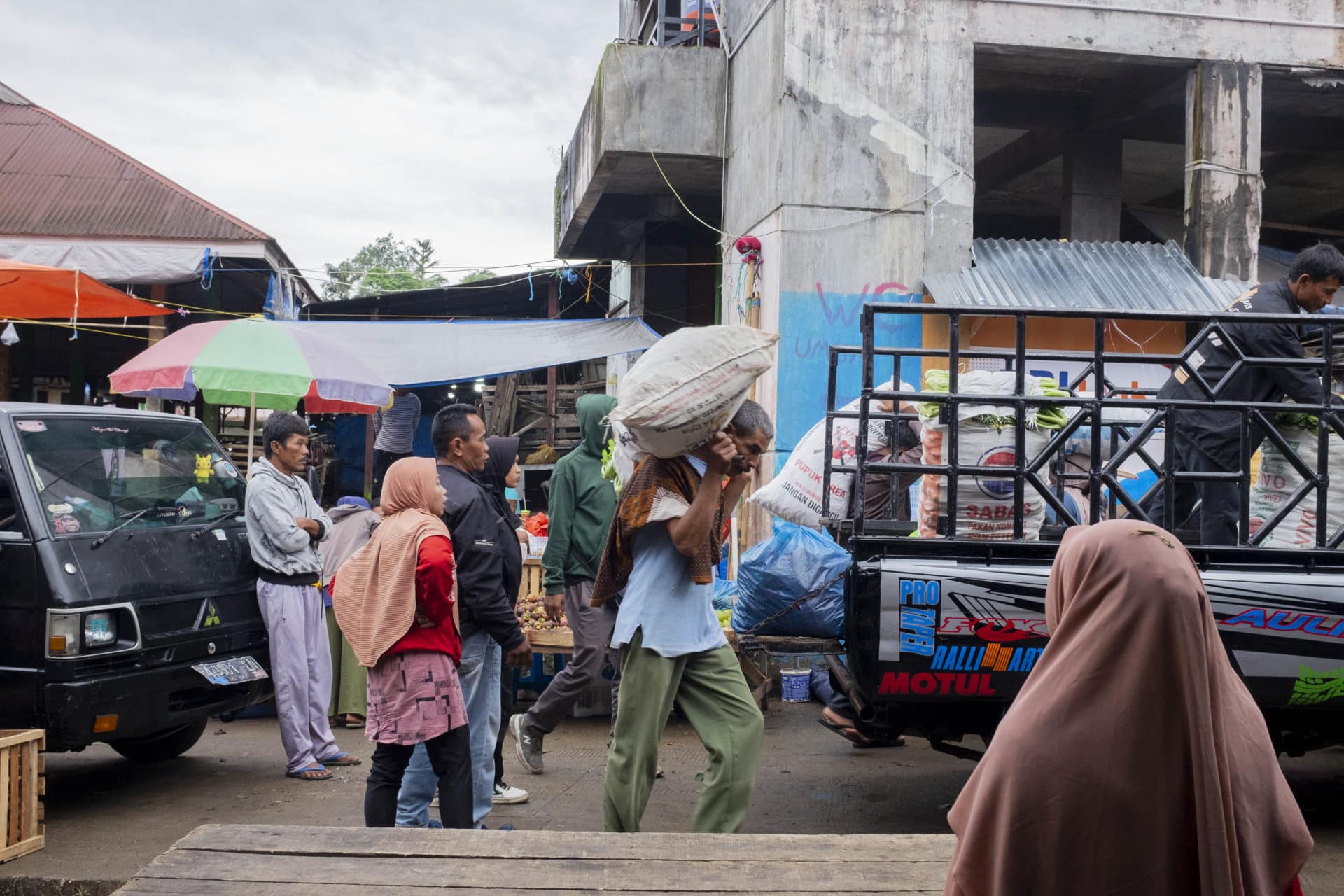
I entered the large market gate. Immediately I was greeted by several traders who tried to bargain with me. ‘What’ve you got? Chillies? Here, here, let’s weigh them!’ A middle-aged woman began leading me in the direction of her scales which were sitting right on the edge of the weathered, cluttered sidewalk. Another person yelled exuberantly at me: ‘quick, quick, the truck’s about to leave!’ Coming up close to me, and holding my bag, he said: ‘how many are there?’
I was shocked at first – I felt almost terrorized. But, fortunately, before I had brought my goods here I had received some advice from a person in the village: ‘don’t sell to the intermediaries, sell to “X” instead, who’s in the warehouse close to the terminal intersection. And say that these chillies come from me’. So operating on that advice, I declared to my terrorizers, a tad sharply: ‘I’m a regular customer of “X”!’
The price of dry red chillies is high right now. The price, it may be said, is really very good right now. All types of chillies are up, including the cabai rawit type I had brought. What’s more, it’s not often that farmers want to plant cabai rawit. They have real advantages: pesticide is only rarely needed for them, yard fertilizer is enough to sustain them, and the plants last a long time. But picking the chillies is difficult. One person can at most pick seven or eight kilograms of chillies off cabai rawit plants per day. That’s why it’s typically a plant for people who grow vegetables more for filling their days than for getting a lot of money. For those with high levels of patience. But by the same token, if someone brings cabai rawit to a market and if the price of dry chillies is currently good, there will be a lot of interest.
You for sure will know, however, that these sort of market middle-men are shrewd in wresting down the prices they pay.
‘This market was here in this spot before we were even a nation’, I heard. ‘What power does the government have to change arrangements that were formed so long before, before there was a government at all, before there was a country at all?’
The boss I sought out, the owner of an extensive warehouse in the middle of the market, was fat, had a long burn mark right down his left hand and a face full of scars left behind by some pox. He sat behind a small table in a corner of the warehouse. With a slight hand signal, he ordered a lackey to place the chillies I had brought on the scales. I was asked to witness the movement of the needle. After it stopped at a particular figure, the eyes of the lackey glanced at me. I nodded to give my agreement. Some of the chillies were removed to produce a round figure. Calculations were made, multiplying the unit price at that particular time – or at that particular second, more correctly, because the unit price can change in an instant, if there so happens to be an incoming telephone call from Pekanbaru or Jambi, Batam or Palembang, Medan or Jakarta, or to whichever place the commodities pooled together at this market get sent. If demand at any of those places is up, the price will go up, and the opposite is also true.
Half-yelling, the lackey told the boss the result the scale had produced and the total that needed to be paid me. Then, with another hand signal, he asked me to move closer to the boss. From his satchel bag, the boss took out and counted some large notes, then handed them over to me, placing them into my hand. Then from a small drawer of his desk he took out some coins, as well.
I had, finally, sold the chillies I had brought to this market. And indeed, a strange feeling crept over me, hard to describe, when I received in my outstretched hand that money for my own produce. A satisfaction, an enjoyment, that felt unique.
‘Do you buy corn as well?’ I asked him.
‘How much d’you have?’
‘Around two chicken feed sacks of it’, I said, quickly estimating.
‘Bring them here then – but not tomorrow, two days from now!’ He explained that tomorrow there was another farmer who would come to sell corn. I couldn’t tomorrow anyway, I told him, perhaps in a week’s time I could harvest it.
‘Phone first if you want to come in, then: I’m scared there’ll be a surplus’.
I nodded, thanked him, and left.
Afterwards, I decided to sit awhile in a busy coffee shop inside the market. Right by the densely-packed T-intersection, where large trucks were lining up. Almost every table was taken, but there was one, with two empty benches on either side, beckoning me to sit down.
‘Sit down here instead, so we can talk!’
A man, both tall and wide, and dark-skinned, showed me a seat at a crowded table. I ordered some food and drink: soto noodle soup and teh telur, tea with an egg yolk, a Sumatran specialty. This man and his friends were having a grand old time chatting. From the man’s arm a tattoo of a dragon breathed fire. Every person who passed by greeted him by calling him ‘chief’. I quickly realized that I was likely sitting with a local mafia boss.
The man was under the weather, his face strained and grimacing, as if trying to restrain his unwell feeling. He burped several times.
‘Gastric acid’, explained someone else at the table.
‘Yeah, if I’m even slightly late to eat, right away I relapse’, the man said.
‘I have some ranitidine’, I offered, taking it out of my jacket pocket.
‘Is it strong?’
‘It’ll neutralize it’, I said as I gave him two tablets.
‘I’ll just take a photo of it, and later I’ll buy it at the pharmacy’.
‘No, no, just take it, it’s no problem, I’ve still got plenty’, I said. ‘Take it half an hour before eating’.
He nodded.
Not long after, a car filled with vegetables drove past in front of the coffee shop. The friend of the ‘chief’ left his chair, went out and handed a bottle of water to the driver, who paid him Rp10,000 for it. A sort of unofficial ticket to enter the market. The man talked a minute to the driver.
‘He didn’t want to pay, then he asks for the road to be asphalted’, he said with a grumble as he returned.
The roads inside the market I suppose were carefully asphalted long ago, but with the passage of time, changeable and relentless weather, plus an inadequate sanitation system, puddles now collect everywhere and don’t drain away.
I looked out at the colorful tents of the traders whose stalls were bunched together on the sidewalks. Smells of leeks, red onions, celery, cabbages, greens and chillies being washed in the warehouses before being packed and put onto large tracks mixed with the stink of lingering wastewater, and also with the smells of food from hawker stalls, and sweat from the porters, truck drivers, and farmers. A combination of sights and smells that was intriguing, tantalizing even, and typical of this disorderly corner of the world.
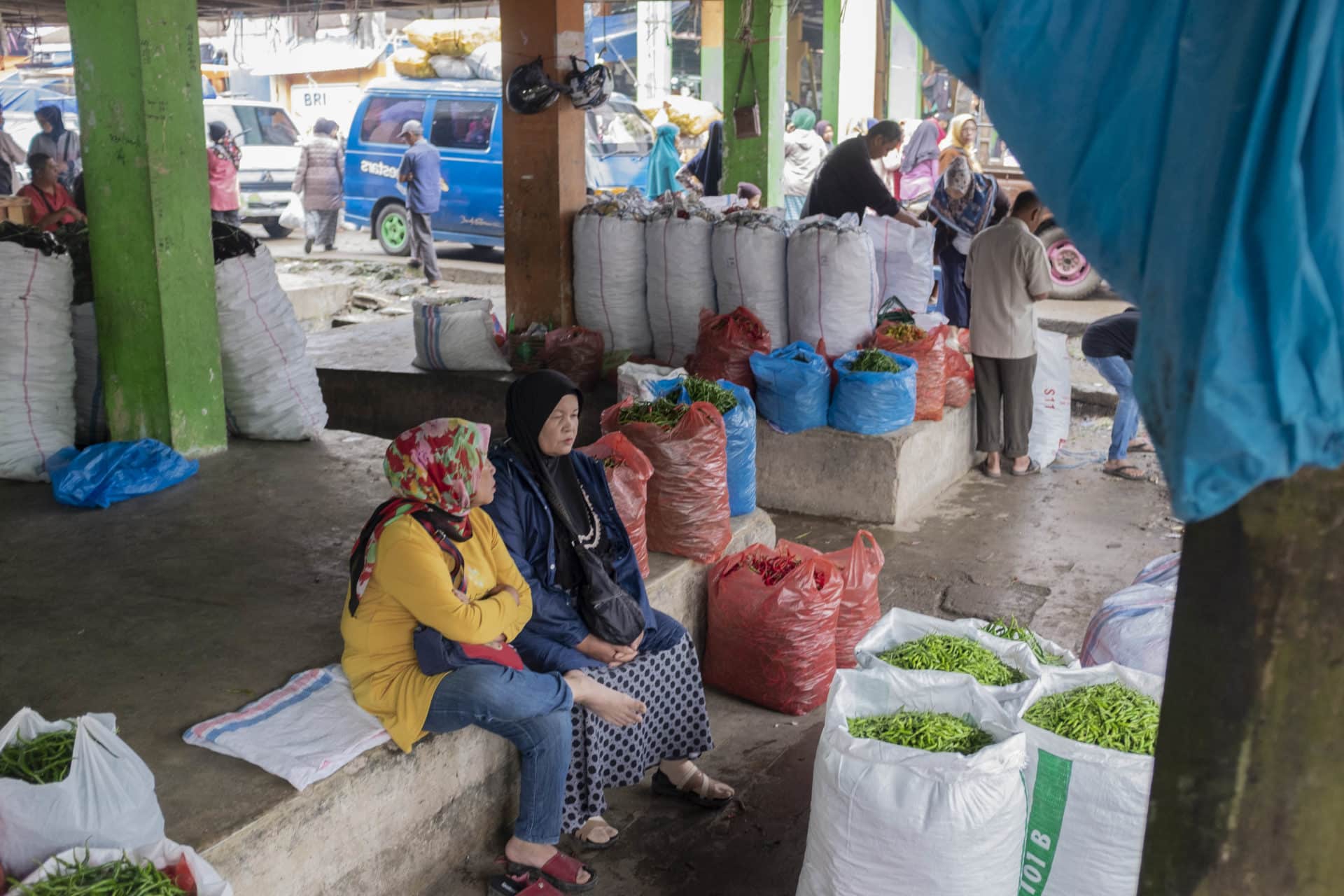
‘The government doesn’t want to fix these roads?’ I asked, curious for their reaction. I knew there have been several attempts by the regional government to bring order to this market, including to the main road in front which is never not bumper-to-bumper despite it being a vital thoroughfare, a part of the Trans-Sumatra Highway. But after years – decades, actually – all those efforts have failed.
‘This market was here in this spot before we were even a nation’, I heard. ‘What power does the government have to change arrangements that were formed so long before, before there was a government at all, before there was a country at all?’
Cigarette smoke floated in the air and filled the coffee shop. Outside, the market was more and more crowded. Horns blasted everywhere, competing with the yells of the big bosses and other sellers, people calling and answering. Then there was the sound of the Quran being read, coming from loudspeakers installed on the top of the market musalla, and the whine of machines grinding up chillies and coconuts, and the knocking on the stalls of sellers of farming equipment, and goods getting dropped and smashed. Vehicles passing by were emitting diesel fumes into air that was getting ever hotter and muggier.
I had found myself feeling curiously at home spending time in this crowded, stuffy market, meeting the sort of people I usually do not meet, and participating in different types of interaction. But I really had to be leaving. Back to my kampung, whose atmosphere is far more tranquil, to complete my usual routine work – or perhaps to go back to tending my small farming plot.
I stopped a village minibus. It pulled up, its door coming to a stop right in front of where I was standing. I took a look inside. Heaving full, no part of any bench free. Again, they were all women in there, with shopping in their laps and on the floor.
‘Come on in, Pak, try towards the back’, said the driver, glancing through the rear mirror. ‘Shift over, ladies!’
Not a single person attempted to make space for me. But I finally decided to get aboard anyway. Only then did rear ends shuffle this way and that, making a small gap for me to sit. I was wedged, yet again, between bodies, goods, and conversations. Amid a traffic jam, the minibus crawled forward. Slowly, the hustle and bustle of the market was left behind. I suspected that soon I would miss it.
© Deddy Arsya
English translation © Sarah Leys




